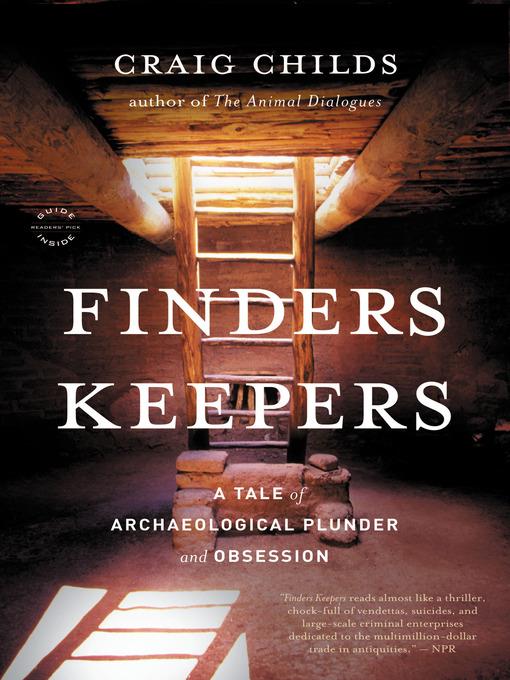
Finders Keepers
A Tale of Archaeological Plunder and Obsession
- اطلاعات
- نقد و بررسی
- دیدگاه کاربران
نقد و بررسی

May 24, 2010
Childs (The Animal Dialogues) intermingles personal experiences as a desert ecologist and adventurer with a journalistic look at scientists, collectors, museum officials, and pot hunters to explore what should happen to ancient artifacts. Questioning whether artifacts should be left in place, Childs argues that although surface surveys and electronic imaging permit study of buried objects without digging, that reliance on technology risks the loss of the "physical connection to the memory of ancient people." Yet he mourns the loss of context that comes from removing, say, the Temple of Dendur from its natural environment. On the other hand, he scrutinizes the "stewardship" of past archeologists who removed sacred objects when "o one thought indigenous cultures would survive to start demanding their things back," returns now required by U.S. law. Childs is critical of museum facilities inadequate to protect items that archeologists removed from their sites precisely to preserve them from destruction. He is also unhappy with the legal sale of relics to collectors, which he believes led to "more digging and smuggling." His own "collection" consists of finds he has left in place across the Southwest. But, he says, artifacts that cannot safely be left in place should go to museums. This is an engaging and thought-provoking look at one of the art and artifacts' world's most heated debates.

May 15, 2010
Naturalist Childs (The Animal Dialogues: Uncommon Encounters in the Wild, 2007, etc.) probes our"meaningful, tangible connection to the people who came long before us."
Growing up in the American Southwest, the author learned to cherish the artifacts he and his father uncovered in the desert. Here he re-creates the experience of holding such an object and imagining the people who used it"centuries, even millennia, earlier." For the past decade, Childs has belonged to"a gang of relic hunters" who search out unaltered archaeology sites in the desert,"scouring the wilderness" to discover the"precious belongings that people cared for" without disturbing them. To remove a relic, keep it as a personal possession, sell it or even give it to a museum violates the author's personal ethic, although he recognizes the value of museums. Federal law honors the ownership rights of Native American tribes to the remains of their dead ancestors and the funerary objects buried with them, challenging the rights of museums such as the Smithsonian. Nonetheless there is a thriving legal and illegal global trade in collectibles. Childs provides plenty of fascinating stories of treasure hunters, collectors, Buddhist monks and other adventurers, many of which are reminiscent of the escapades of Indiana Jones. One would-be collector was caught with a pair of sandals in his home that were 10,000 years old. After receiving an 18-month prison sentence, he attempted to hire a hit man to kill the judge, and his ex-wife, who had given incriminating evidence to the police. A private Santa Fe collector hoards the treasure he found on land he purchased, which contained the ruins of"a multithousand-room pueblo occupied from pre-Columbian times up to the installation of a Spanish mission."
A colorful, informative excavation.
(COPYRIGHT (2010) KIRKUS REVIEWS/NIELSEN BUSINESS MEDIA, INC. ALL RIGHTS RESERVED.)

Starred review from September 1, 2010
This is a delightful account of the complicated world of archaeology by an author who loves (one might even say is borderline obsessed with) the past. Naturalist Childs (The Animal Dialogues: Uncommon Encounters in the Wild) explores both sides of the debate over the ethics of archaeology, of who owns the past--as well as who has the right to dig, sell, and keep uncovered artifacts. What Childs does brilliantly throughout is to keep asking the reader who is right and who is wrong. Are the archaeologist, museum curators, and scholars the good guys? Are the looters, private collectors, and ordinary people digging up artifacts the bad guys? Or is it the opposite? The reader finds that there is no easy answer when it comes to our past. VERDICT This nicely wrought, even poetic book about archeological excavation and the variety of people who are passionate about the past and its artifacts will fascinate everyone from high school students to professional archaeologists digging in the field. Highly recommended. [See Prepub Alert, LJ 3/15/10.]--Melissa Aho, Bio-Medical Lib., Univ. of Minnesota, Minneapolis
Copyright 2010 Library Journal, LLC Used with permission.




دیدگاه کاربران